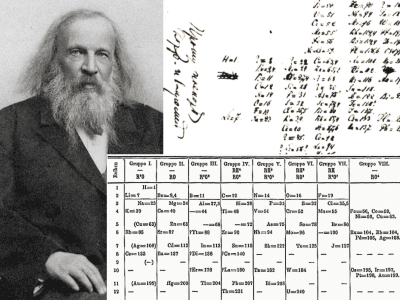 |
|
Dmitri Mendeleev discovered the
Periodical Table of Chemical Elements
subconsciously while he was
asleep.
"In a dream I saw a table where all
the elements fell into place as required. Awakening, I immediately
wrote it down on a piece of paper." ~ Dmitri Mendeleev |
|
| |
|
Dmitri Mendeleev, a great
Russian chemical scientist,
was obsessed with finding a
logical way to organize the
chemical elements. He wrote the
elements’ names and the
properties of every element on
cards – one element on each
card. He saw that atomic weight
was important in some way, but
he could not find a pattern.
|
|
|
| |
Convinced that he was close to
discovering something
significant, Mendeleev moved the
cards about for many hours until
finally he fell asleep at his
desk. And his
subconscious mind
had done his work for him –
Mendeleev saw a logical
arrangement of the chemical
elements in a dream.
|
|
 |
| |
|
Dmitri Mendeleev later wrote:
“In a dream I saw a table where
all the elements fell into place
as required. Awakening, I
immediately wrote it down on a
piece of paper.”
|
|
|
 |
The elements, if arranged
according to their atomic
weights, exhibit an apparent
periodicity of properties. |
Dmitri
Mendeleev |
| |
Dmitri Mendeleev was a chemist
of
genius, first-class
physicist, a fruitful researcher
in the fields of hydrodynamics,
meteorology, geology, certain
branches of chemical technology.
He formulated the Periodic Law,
created the periodic table of
elements, and used it to correct
the properties of some already
discovered elements and also to
predict the properties of eight
elements yet to be discovered.
|
|
|
 |
Work, look
for peace and calm in work: you will
find it nowhere else. |
Dmitri Mendeleev |
| |
It
is the function of science to
discover the existence of a
general reign of order in nature
and to find the causes governing
this order. And this refers in
equal measure to the relations
of men ‒ social and political ‒
and to the entire universe as a
whole.
|
|
The
Universe
The Laws
of the Universe
HIGERsight |
|
 |
|
No law of nature, however general, has
been established all at once; its recognition has always been
preceded by many presentiments.
There exists everywhere a medium in
things, determined by equilibrium. |
|
|
|
|
The establishment of a law,
moreover, does not take place
when the first thought of it
takes form, or even when its
significance is recognised, but
only when it has been confirmed
by the results of the
experiment.
Pleasures flit by ‒ they are
only for yourself; work leaves a
mark of long-lasting joy, work
is for others.
|
|
 |
I want you
to have this feeling too ‒ it is my
moral responsibility to help you achieve
this inner freedom. |
Dmitri Mendeleev |
|
|